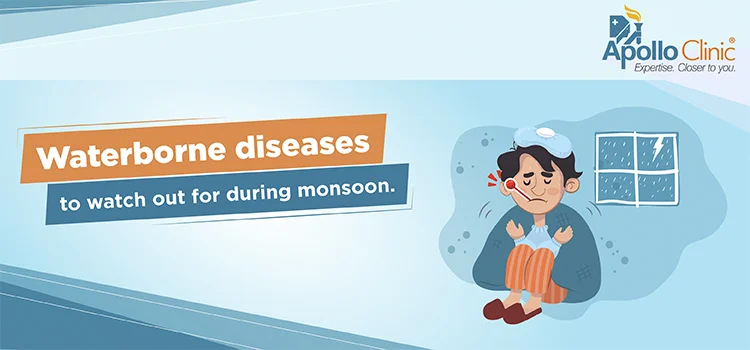Water-borne diseases to watch out for during Monsoons
With monsoons arriving sequentially in certain parts of the country, it is necessary to watch out for the share of problems and diseases that they are expected to bring along. Although most of us are taking precautions against the seasonal flu, especially with COVID-19 cases on the rise, extremely catastrophic water-borne ailments are being overlooked.
India has always been dealing with water-borne diseases with the effects and associative conditions escalating upon the advent of monsoon. Indian monsoons are characterized by unrelenting spells of rain, which unwittingly establishes contact between the groundwater and the sewage. This undesirable association causes germ buildup within the body and makes way for a host of ailments, often characterized by diarrhea, dysentery, nausea, and other symptoms.
Here are the most prevalent water-borne diseases that you need to prepare for:
- Cholera
Deemed as one of the common water-borne ailments, cholera is often characterized by extreme levels of diarrhea and associative dehydration. Caused by a potent bacterial strain, i.e., Vibrio Cholera, this disease can spread quickly and infect a massive chunk of population in no time.
In the case of cholera, the bacterial strain directly associates itself with the digestive tract, increasing further at an uncontrollable rate. The only way to steer clear of the same is to keep drinking purified water, which goes through extensive filtration levels, including UV, MF, and Reverse Osmosis. For starters, boiling the water is also a common and useful practice.
- Dysentery
Often termed as a symptom, dysentery is also a full-fledged ailment that is most active during heavy monsoons. The disease is identified by a mild fever, dehydration, nausea, and occasional stomach cramps. In India, monsoons minimize the accessibility to clean drinking water, and this is why dysentery is a common health issue in rural and even in a few urban establishments.
- Typhoid
Bacterial infections like typhoid are common during monsoons. This is also a water-borne issue caused by Salmonella Typhi. Mostly encountered in developing countries where people have restricted access to clean drinking water, typhoid is often associated with fever, muscle ache, sweating, and constipation.
- Giardia
Although the name might sound uncommon, Giardia is strictly a parasitic ailment, transmitted via water sources. Unlike other diseases that get cured with time, the Giardia parasite is capable of residing in the intensive for years. Some of the common symptoms include gradual weight loss, bloating, and abdominal pain.
- Hepatitis-A
Precisely a liver infection, Hepatitis-A is caused if you consume contaminated water or come in contact with an infected person. Some of the pronounced symptoms include jaundice, vomiting, loss of appetite, rashes, and sudden fever.
While most of these water-borne diseases are at their prime during the monsoons, maintaining proper water-hygiene and purification standards are the best combative methods. However, if you are showing any mentioned symptoms, despite taking the precautions, you must immediately visit Apollo Clinic and get a health checkup done. Besides exceptional diagnostic services, Apollo Clinic also offers credible consultations, vaccinations against ailments, and home-based health services for individuals who aren’t willing to get admitted.

